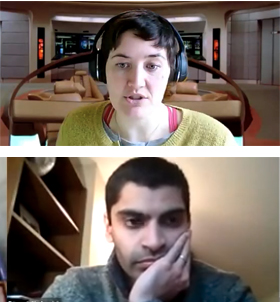
Reducing NHS waiting lists in times of COVID

Jessica Enright and Ramesh Nadarajah
Cardiovascular disease is the leading cause of death for men in the UK and second most for women. During the first lockdown from March 2020, elective cardiac procedures and outpatient consultations were postponed and many appointments have not yet been rescheduled. In addition, those who were suffering from heart conditions did not see their GP or come to hospital. The resulting backlog presents a huge challenge.
In this podcast we talk to cardiologist Ramesh Nadarajah and computer scientist Jessica Enright about a recent meeting between clinicians and mathematicians which aimed to tackle the problem. The three-day brainstorming session, part of a programme of activities by the Virtual Forum for Knowledge Exchange in Mathematical Sciences, developed potential solutions that could also help reduce waiting lists for other conditions — and demonstrated the astonishing power mathematics can have even when you least expect it.
You can listen to the podcast using the player above, and you can listen and subscribe to our podcast through Apple Podcasts, Spotify and through most other podcast providers via podbean.
The Virtual Forum for Knowledge Exchange in Mathematical Sciences is an initiative of the Isaac Newton Institute, the Newton Gateway to Mathematics, the Knowledge Transfer Network, and the International Centre for Mathematical Sciences, along with various representatives from the mathematical sciences community. The main aim has been to identify a range of virtual approaches that help to address challenges from business and industry, the third sector, and other groups outside academia. These challenges may be long-standing or may have arisen directly as a consequence of the present disruption to UK society.
This podcast is part of our collaboration with the Isaac Newton Institute for Mathematical Sciences (INI), an international research centre and our neighbour here on the University of Cambridge's maths campus. INI attracts leading mathematical scientists from all over the world, and is open to all. Visit www.newton.ac.uk to find out more.
